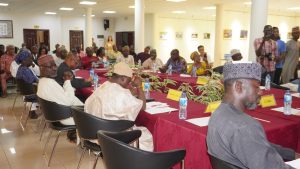Stakeholders emphasize the importance of tourism, cultural exchange between Nigeria, China
By: Mnena Iyorkegh,
Stakeholders have emphasized the importance of tourism and cultural exchange in promoting mutual understanding and cooperation between Nigeria and China within the Belt and Road Initiative (BRI) to enhance the two countries’ bilateral relations.
The emphasis was made at a Seminar on “Promoting Culture and Tourism Exchange In BRI Cooperation”, in Abuja, Nigeria’s capital. The Belt and Road Initiative (BRI) is a global infrastructure development strategy adopted by the Chinese government in 2013 to invest in more than 150 countries and international organizations.
Speaking at the Seminar, the Executive Secretary, of the National Institute for Cultural Orientation (NICO), Mr. Otunba Ajiboye, while expressing appreciation to the Chinese government for their continuous support in developing Nigeria’s culture and tourism sector, also noted that cultural exchange is a powerful tool that can bridge gaps, foster mutual understanding, and create lasting bonds between peoples and nations.

“Nigeria has a wealth of natural and cultural attractions ranging from stunning landscapes of its national parks to the historic landmarks and vibrant cities that tell the story of our nation. We must therefore leverage the BRI to enhance our tourism infrastructure, promote sustainable tourism practices, and create unique cultural experiences for visitors. By doing so, we can attract more tourists, generate revenue, and create jobs while preserving and celebrating our cultural heritage. We will work closely with our Chinese counterparts to develop joint projects, exchange programmes and collaborative initiatives that mutually benefit both countries. Ajiboye said.
Similarly, the Chinese Embassy in Nigeria restated its commitment to promote tourism and cultural exchange with Nigeria within the Belt and Road Initiative (BRI) to enhance the two countries’ bilateral relations.
The Cultural Counselor of the Chinese Embassy, Mr. Li Xuda, said that the Embassy prioritises promoting people-to-people ties between China and Nigeria, hence cultural and tourism exchange play a vital role in societal progress and national development.

“The joint construction of BRI takes “Five Cooperation Priorities” as the main content: Policy Coordination, Facilities Connectivity, Unimpeded Trade, Financial Integration and People-to-People Bond. The people-to-people bond, one of the five cooperation priorities of the BRI, goes beyond culture and tourism exchange and seeks to build a common understanding out of respect for countries and regions in its big family.
Both China and Nigeria are cultural giants with fabulous ancient civilizations and rich tourism resources. 6 years ago, China and Nigeria became close partners in jointly building BRI, which made our bilateral exchange even more in-depth and practical. I firmly believe that our culture and tourism will be further promoted in the new stage of high-quality joint construction of BRI and some of our cultural gaps and exchange barriers will be bridged”. Li said.
According to the Permanent Secretary Nigeria’s Minister of Art Culture and Creative Economy, James Sule, the two nations must work together to harness the potential of cultural and creative industries to foster mutual understanding, promote cultural diversity, and drive sustainable development.


“BRI has over the years provided a valuable platform for enhancing cultural and tourism exchanges between Nigeria and China. The connectivity established through the Belt and Road Initiative has opened up new opportunities for collaboration in the fields of art, culture, and creative economy. The vibrant cultural heritage of Nigeria, combined with the rich cultural traditions of China, has resulted in unique and enriching experiences for visitors from both countries. We must build on these achievements and continue to foster stronger ties in the realm of culture and tourism.
According to the Head of the Department, of Political Science, University of Abuja, Professor Sherrif Ghali Ibrahim, the BRI is a concerted effort to create “an international community of a shared future for humanity. The initiative has already benefited Nigeria significantly, with China providing funds for various infrastructure projects in the country.
The Seminar, with over forty participants, is jointly hosted by the Chinese Embassy in Nigeria, the China Alumni Association, and the University of Abuja, and is aimed at promoting culture and tourism exchange between Nigeria and China under the framework of the BRI.

